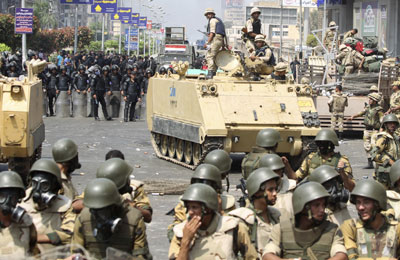
Riot police and army personnel take up positions
during clashes with Mursi supporters.
Turkey urges UN to stop Egypt 'massacre'
Ankara, August 14, 2013
Turkey urged the UN Security Council and Arab League on Wednesday to act quickly to stop a "massacre" in Egypt, and Iran warned of the risk of civil war, after Egyptian security forces killed dozens of Islamist demonstrators.
European leaders criticised the violence against a camp of protesters seeking the restoration of deposed Islamist President Mohamed Mursi, calling for restraint and a return to meaningful dialogue to defuse Egypt's political stand-off.
Turkish President Tayyip Erdogan said international passivity had paved the way for the military-backed Egyptian government's crackdown, which included violence in areas beyond the capital that killed at least 14 protesters.
"It is clear that the international community, by supporting the military coup (that ousted Mursi on July 3), and remaining silent over previous massacres instead of protecting democracy and constitutional legitimacy in Egypt, has encouraged the current administration to carry out today's intervention.
"The international community, especially the UN Security Council and Arab League, must act immediately to stop this massacre," Erdogan, whose government is Islamist-rooted, said in a statement.
His office said he had spoken to UN Secretary-General Ban Ki-moon and separately to all permanent members of the Security Council this week about the crisis.
EMBASSY PROTEST
Some 300 protesters gathered outside the Egyptian embassy in the Turkish capital Ankara, then went to the gates of the US embassy, where they chanted anti-US slogans and carried pictures of Mursi.
Turkey has emerged as one of the sharpest international critics of what it has called an "unacceptable coup" after Egypt's military ousted the elected president on July 3, following weeks of widespread protests against his rule.
Iran, whose hardline Islamist leadership put down post-election unrest by force in 2009, denounced the Egyptian bloodshed and called for a "national dialogue and democratic process".
In a statement, the Foreign Ministry expressed deep concern and added: "Undoubtedly the current approach ... strengthens the likelihood of civil war in this great Islamic country."
Qatar took the lead in Arab criticism of the violence, condemning the attack on the protest camp and urging Egyptians to return to dialogue to ease the crisis polarising the Arab world's most populous nation.
A Qatari Foreign Ministry official, quoted by the state news agency QNA, said Egyptian authorities should "refrain from the security option in dealing with peaceful protests, and preserve the lives of Egyptians at protest sites".
Qatar strongly backed Mursi's Muslim Brotherhood government before he was ousted by the army a year after becoming the first freely elected leader in Egyptian history.
"Qatar believes that the safest and guaranteed way to resolve the crisis is a peaceful way based on dialogue between parties that have to live together in a pluralist social and political system," the official said.
QATARI AID
Qatar, among the world's wealthiest states, gave Egypt $7 billion in aid after Mursi's election last year following the 2011 uprising that toppled longtime autocrat Hosni Mubarak.
In the Palestinian Gaza Strip, a spokesman for the ruling Islamist Hamas movement, which arose out of the Egyptian Muslim Brotherhood, said Hamas "condemns the massacres ... and calls for an end to bloodshed and a halt to the killing of peaceful protesters".
European Union foreign policy chief Catherine Ashton said she was following the situation with great concern.
"Confrontation and violence is not the way forward to resolve key political issues. I deplore the loss of lives, injuries and destruction in Cairo and other places in Egypt. I call on the security forces to exercise utmost restraint and on all Egyptian citizens to avoid further provocations and escalation," she said in a statement.
Britain, France, Germany, Spain and Norway all appealed for mutual restraint by Egypt's factions and for negotiations to resolve the crisis. Britain said it had advised its citizens visiting Egypt to avoid demonstrations and large gatherings.
"It is essential that violence stop and conciliation prevail. France calls on all sides to show restraint and hold back from disproportionate use of force," French Foreign Ministry spokesman Vincent Floreani said.
German Foreign Minister Guido Westerwelle said: "We expect the transitional government and Egyptian authorities to allow peaceful protest and do everything to ease the situation." - Reuters







